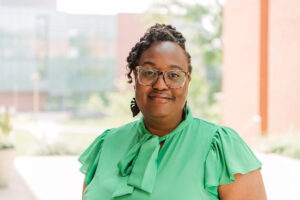Elizabeth Patton, Associate Professor
 “As a media studies professor, I believe that I have a responsibility to help students critically engage with media and to develop a desire to take positive action in their communities to promote inclusion, equity, and anti-racism in our society. Therefore, my course materials address structural inequities and center diverse and critical perspectives that reflect the diversity of people on campus and in our society. For example, I developed a course that examines representations of spaces in the media, such as the city vs. suburbs, the home, and sports stadiums, and how these mediated spaces convey hegemonic and ideological messages regarding social identities, such as gender, sexuality, race, and class. My goal was to create a course that allows students to understand how the underlying workings of privilege, status, inequality in the media contribute to inequality in actual spaces within the private and public spheres. Some of the questions that the course addresses are: How do audiences understand social markers of identity through mediated spaces? How does the media contribute to structural inequality?
“As a media studies professor, I believe that I have a responsibility to help students critically engage with media and to develop a desire to take positive action in their communities to promote inclusion, equity, and anti-racism in our society. Therefore, my course materials address structural inequities and center diverse and critical perspectives that reflect the diversity of people on campus and in our society. For example, I developed a course that examines representations of spaces in the media, such as the city vs. suburbs, the home, and sports stadiums, and how these mediated spaces convey hegemonic and ideological messages regarding social identities, such as gender, sexuality, race, and class. My goal was to create a course that allows students to understand how the underlying workings of privilege, status, inequality in the media contribute to inequality in actual spaces within the private and public spheres. Some of the questions that the course addresses are: How do audiences understand social markers of identity through mediated spaces? How does the media contribute to structural inequality?
My commitment to diversity, equity, and inclusion also extends to my work outside of the classroom. This includes serving as a research mentor for students of color in programs such as the McNair Scholars Program and the Undergraduate Research and Creative Achievement Day (URCAD) and serving as a committee member of the Antiracism, Equity and Diversity Task Force for my professional organization, the Society for Cinema and Media Studies (SCMS). In this role, I support the task force in offering discipline-specific antiracist, cultural competency, and advocacy training as a regular feature of SCMS. We also seek to recruit and create a pipeline for media scholars of color by strengthening diversity initiatives in existing pipeline programs as well as developing new pipelines for our membership amongst minority-serving institutions.
My current book project, “Representation as a Form of Resistance: Documenting African-American Spaces of Leisure during the Jim Crow Era,” examines the history of Black leisure and tourism in the US through the perspective of media to understand lingering forms of racism that still affect Black tourism, such as racial discrimination on the Airbnb platform. Through archival research, I am examining the use of photographs (professional and personal), guidebooks (e.g., The Negro Motorist Green Book), historic Black newspapers, magazines such as Ebony, and home videos to document leisure practices. My goal is to advance our understanding of how African Americans used media to document leisure practices as an undervalued and unacknowledged form of resistance. I believe that the experiences of African Americans, whose worth historically was equated with labor, help us reevaluate our understanding of leisure as a fundamental human right.
As the education system in the U.S. continues to change, hopefully for the better, who teaches, what is taught, and how it is taught has become increasingly important. A key factor in changing higher education for the better is a commitment to diversity, equity, and inclusion initiatives. I am committed to contributing to the advancement of social justice in my research, teaching, and service to the university and my community.”